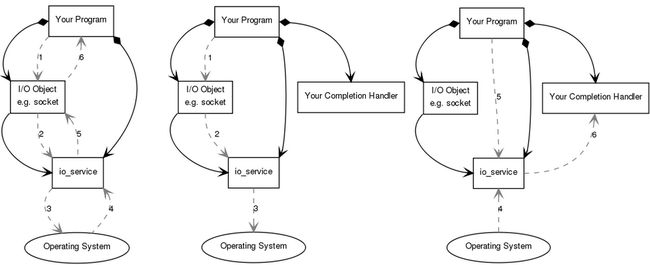Boost.Asio使用入门
1、概述:Boost.Asio是一个跨平台的C++库,用于网络和底层I/O编程,可以在I/O对象(如socket)上执行同步和异步操作。
2、简略的过程分析。以socket的连接操作为例:
你的程序中需要至少定义一个io_service对象:boost::asio::io_service io_service。io_service表示程序到操作系统I/O服务的“连接”。
为执行I/O操作,还需要一个I/O对象(通常需要使用io_service构造),如一个TCP套接字:boost::asio::ip::tcp::socket socket(io_service)。
1)同步的连接过程中,发生以下事件序列(对应下面的左图):
(1)程序通过I/O对象启动连接操作:socket.connect(server_endpoint);
(2)I/O对象将请求转发给io_service;
(3)io_service请求操作系统去执行连接操作;
(4)操作系统将操作结果返回给io_service;
(5)io_service将操作的(错误)结果转换成boost::system::error_code对象,并回传给I/O对象;
(6)如果操作失败,I/O对象抛出boost::system::system_error异常。
如果是使用以下方式,则只设置错误码,不会抛出异常:
boost::system::error_code ec;
socket.connect(server_endpoint, ec);
2)异步的连接过程中,发生以下事件序列(对应下面的中图和右图):
(1)程序通过I/O对象启动连接操作:socket.async_connect(server_endpoint, your_completion_handler);
your_completion_handler是一个函数(对象),原型:void your_completion_handler(const boost::system::error_code& ec);
(2)I/O对象将请求转发给io_service;
(3)io_service发信号给操作系统,告知它去开始一个异步的连接操作;
一段时间过去... ...注意,在同步的情形下,程序会一直等待连接操作完成,而异步则是先立即返回。
(4)连接操作完成时,操作系统把结果放在队列中;
(5)程序必须调用io_service::run()(或类似函数)以取得操作结果。一般在你刚启动第一个异步操作时就要调用run();
io_service对象未停止(stopped()返回false)且还有未完成的操作时,run()会一直阻塞,否则直接返回。
asio保证了回调函数只会被run()所在线程调用。因此,若没有run(),回调函数永远不会被调用。
(6)在run()中io_service将操作结果取出队列并翻译成error_code,然后传递给your_completion_handler。
3、例子:
// g++ server.cpp -std=c++11 -lboost_system // 一个简单的回显服务器 #include <array> #include <cstdlib> #include <iostream> #include <memory> #include <type_traits> #include <utility> #include <boost/asio.hpp> using boost::asio::ip::tcp; // Class to manage the memory to be used for handler-based custom allocation. // It contains a single block of memory which may be returned for allocation // requests. If the memory is in use when an allocation request is made, the // allocator delegates allocation to the global heap. class handler_allocator { public: handler_allocator() : in_use_(false) {} handler_allocator(const handler_allocator&) = delete; handler_allocator& operator=(const handler_allocator&) = delete; void* allocate(std::size_t size) { if (!in_use_ && size < sizeof(storage_)) { in_use_ = true; return &storage_; } else return ::operator new(size); } void deallocate(void* pointer) { if (pointer == &storage_) in_use_ = false; else ::operator delete(pointer); } private: // Storage space used for handler-based custom memory allocation. typename std::aligned_storage<1024>::type storage_; // Whether the handler-based custom allocation storage has been used. bool in_use_; }; // Wrapper class template for handler objects to allow handler memory // allocation to be customised. Calls to operator() are forwarded to the // encapsulated handler. template <typename Handler> class custom_alloc_handler { public: custom_alloc_handler(handler_allocator& a, Handler h) : allocator_(a), handler_(h) {} template <typename ...Args> void operator()(Args&&... args) { handler_(std::forward<Args>(args)...); } friend void* asio_handler_allocate(std::size_t size, custom_alloc_handler<Handler>* this_handler) { return this_handler->allocator_.allocate(size); } friend void asio_handler_deallocate(void* pointer, std::size_t /*size*/, custom_alloc_handler<Handler>* this_handler) { this_handler->allocator_.deallocate(pointer); } private: handler_allocator& allocator_; Handler handler_; }; // Helper function to wrap a handler object to add custom allocation. template <typename Handler> inline custom_alloc_handler<Handler> make_custom_alloc_handler( handler_allocator& a, Handler h) { return custom_alloc_handler<Handler>(a, h); } class session : public std::enable_shared_from_this<session> { public: session(tcp::socket socket) : socket_(std::move(socket)) {} void start() { do_read(); } private: void do_read() { auto self(shared_from_this()); socket_.async_read_some(boost::asio::buffer(data_), // 异步read make_custom_alloc_handler(allocator_, [this, self](boost::system::error_code ec, std::size_t length) // 读操作完成时调用。参数:操作结果、读取的字节数 { if (!ec) { do_write(length); } })); } void do_write(std::size_t length) { auto self(shared_from_this()); boost::asio::async_write(socket_, boost::asio::buffer(data_, length), // 异步write make_custom_alloc_handler(allocator_, [this, self](boost::system::error_code ec, std::size_t /*length*/) { if (!ec) { do_read(); } })); } tcp::socket socket_; // 和客户端通信的socket std::array<char, 1024> data_; // 保存从客户端接收到的数据 // The allocator to use for handler-based custom memory allocation. handler_allocator allocator_; }; class server { public: server(boost::asio::io_service& io_service, short port) : acceptor_(io_service, tcp::endpoint(tcp::v4(), port)), socket_(io_service) { do_accept(); } private: void do_accept() { acceptor_.async_accept(socket_, // 异步accept,等待客户端连接 [this](boost::system::error_code ec) // 注册回调函数 { if (!ec) std::make_shared<session>(std::move(socket_))->start(); do_accept(); }); } tcp::acceptor acceptor_; tcp::socket socket_; }; int main(int argc, char* argv[]) { try { if (argc != 2) { std::cerr << "Usage: server <port>\n"; return 1; } boost::asio::io_service io_service; server s(io_service, std::atoi(argv[1])); io_service.run(); } catch (std::exception& e) { std::cerr << "Exception: " << e.what() << "\n"; } return 0; }
参考资料:
http://www.boost.org/
不断学习中。。。
